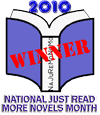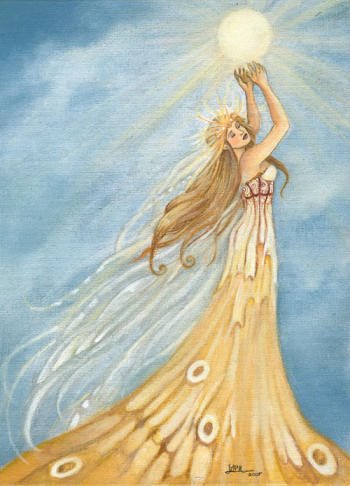
Not only is today, April 23 the day of William Shakespeare's birth, it is also the day of his death! So, even though my knowledge of Shakepeare's works is limited to what I read in school (Macbeth, Romeo & Juliet, Julius Ceasar and Much Ado about Nothing), I thought it would be remiss of me if I didn't acknowledge probably the greatest writer in history! (I'm also planning on reading A Midsummer's Night Dream for the Once Upon a Time Challenge). (Most of the information below comes from the Shakespeare Resource Center online).
William Shakespeare was born in Stratford-upon-Avon, allegedly on April 23, 1564. Church records from Holy Trinity Church indicate that he was baptized there on April 26, 1564. Young William was born of John Shakespeare, a glover and leather merchant, and Mary Arden, a landed local heiress. William, according to the church register, was the third of eight children in the Shakespeare household—three of whom died in childhood. John Shakespeare had a remarkable run of success as a merchant, alderman, and high bailiff of Stratford, during William's early childhood. His fortunes declined, however, in the late 1570s. There is great conjecture about Shakespeare's childhood years, especially regarding his education. It is surmised by scholars that Shakespeare attended the free grammar school in Stratford, which at the time had a reputation to rival that of Eton. As the records do not exist, we do not know how long William attended the school, but certainly the literary quality of his works suggest a solid education. What is certain is that William Shakespeare never proceeded to university schooling, which has stirred some of the debate concerning the authorship of his works.
The next documented event in Shakespeare's life is his marriage to Anne Hathaway on November 28, 1582. William was 18 at the time, and Anne was 26—and pregnant. Their first daughter, Susanna, was born on May 26, 1583. The couple later had twins, Hamnet and Judith, born February 2, 1585 and christened at Holy Trinity. Hamnet died in childhood at the age of 11, on August 11, 1596. For the seven years following the birth of his twins, William Shakespeare disappears from all records, finally turning up again in London some time in 1592. This period, known as the "Lost Years," has sparked as much controversy about Shakespeare's life as any period. Rowe notes that young Shakespeare was quite fond of poaching, and may have had to flee Stratford after an incident with Sir Thomas Lucy, whose deer and rabbits he allegedly poached. There is also rumor of Shakespeare working as an assistant schoolmaster in Lancashire for a time, though this is circumstantial at best.
It is estimated that Shakespeare arrived in London around 1588 and began to establish himself as an actor and playwright. By 1594, he was not only acting and writing for the Lord Chamberlain's Men (called the King's Men after the ascension of James I in 1603), but was a managing partner in the operation as well. With Will Kempe, a master comedian, and Richard Burbage, a leading tragic actor of the day, the Lord Chamberlain's Men became a favorite London troupe, patronized by royalty and made popular by the theatre-going public.
Shakespeare's success is apparent when studied against other playwrights of this age. His company was the most successful in London in his day. He had plays published and sold in octavo editions, or "penny-copies" to the more literate of his audiences. Never before had a playwright enjoyed sufficient acclaim to see his works published and sold as popular literature in the midst of his career. In addition, Shakespeare's ownership share in both the theatrical company and the Globe itself made him as much an entrepeneur as artist. While Shakespeare might not be accounted wealthy by London standards, his success allowed him to purchase New House and retire in comfort to Stratford in 1611.
William Shakespeare wrote his will in 1611, bequeathing his properties to his daughter Susanna (married in 1607 to Dr. John Hall). To his surviving daughter Judith, he left £300, and to his wife Anne left "my second best bed." William Shakespeare allegedly died on his birthday, April 23, 1616. This is probably more of a romantic myth than reality, but Shakespeare was interred at Holy Trinity in Stratford on April 25. In 1623, two working companions of Shakespeare from the Lord Chamberlain's Men, John Heminges and Henry Condell, printed the First Folio edition of his collected plays, of which half were previously unpublished.
William Shakespeare's legacy is a body of work that will never again be equaled in Western civilization. His words have endured for 400 years, and still reach across the centuries as powerfully as ever. Even in death, he leaves a final piece of verse as his epitaph:
'Good friend, for Jesus' sake forbeare
To dig the dust enclosed here.
Blessed be the man that spares these stones,
And cursed be he that moves my bones"
His works include:
Comedies:
- All's Well That Ends Well
- As You Like It
- The Comedy of Errors
- Love's Labor's Lost
- Measure for Measure
- The Merchant of Venice
- The Merry Wives of Windsor
- A Midsummer Night's Dream
- Much Ado About Nothing
- The Taming of the Shrew
- Twelfth Night; Or, What You Will
- The Two Gentlemen of Verona
Tragedies:
- Antony and Cleopatra
- Coriolanus
- Hamlet, Prince of Denmark
- Julius Caesar
- King Lear
- Macbeth
- Othello, the Moor of Venice
- Romeo and Juliet
- Timon of Athens
- Titus Andronicus
- Troilus and Cressida
Histories:
- Henry IV, Part I
- Henry IV, Part II
- Henry V
- Henry VI, Part I
- Henry VI, Part II
- Henry VI, Part III
- Henry VIII
- King John
- Richard II
- Richard III
Late Romances:
- Cymbeline
- Pericles
- The Tempest
- The Two Noble Kinsmen
- The Winter's Tale
Sonnets and Poetry.
I really to read more Shakespeare. I think to think I'm well-read person, but I seriously lacking in the Bard!
Later!!





























5 comments:
Nice job on your post. Looks like you did your research, Stephanie. I love Shakespeare. He was quite an interesting figure, I just wish more was known about his early life.
I'm going to be reading "A Will in the World" for the Non-fiction Five challenge and hopefully that biography will plug up some holes in Shakespeare's history for me.
Wonderful post! I'm going to be reading Will in the World by Stephen Greenblatt (like Kookiejar), so maybe I'll fill in a few holes in my Shakespeare knowledge, too.
And I'm going to join in the Once Upon a Time Challenge for Midsummer Night's Dream, since the last time I read that was when we performed it in 7th grade...
Loads of great info, thanks a lot! My head today told us about the same birth/death date- I didn't have a clue! I was as suprised as the kids:) Goodness knows how that one passed me by.
By that I meant Headteacher:)
Ugg. I need to read more Shakespeare. I've read Macbeth, Hamlet, Othello (favorite), Romeo & Juliet, Julius Caesar, and part of A Midsummer Night's Dream. My friends and colleagues are way ahead of me in this department, but I just don't have the energy to dive into any more.
Post a Comment